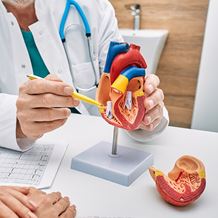
- Home
- Services
- Cardiac Services
- Tests
- Electrophysiological (EP) Studies
What are electrophysiological studies?
Electrophysiological studies is a type of test that is used to examine the electrical activity in your heart in greater detail. It can diagnose and treat a wide range of abnormal heart rhythms. The heart naturally produces a series of electrical impulses which control the pace of your heartbeat. These currents also help keep the blood flowing effectively around your body. EP studies provide a detailed map of the electrical pathways that the heart uses every time it beats. This information can then be used to determine the cause of an irregular heart rhythm (arrythmia), or an abnormally fast heart rate (tachycardia). The same procedure can be used to provide treatment.
How does it work?
EP studies work by guiding a number of small thin catheters along the artery to the heart, using a special type of X-ray machine. The catheters are used to deliver electrical impulses that stimulate the heart and prompt an accelerated heartbeat. The spread of electrical impulses are then carefully mapped to help your doctor understand which part of the heart is causing the abnormal heart rhythm. During the procedure, your doctor may deliver certain medication that impact the electrical activity in specific areas to see how it affects your condition. Once your heart condition has been diagnosed, your doctor may recommend cardiac ablation as an appropriate treatment pathway. This can be performed within the same procedure.
Why do I need it?
EP studies are an effective way of understanding how electrical signals are moving through your heart. It is a useful test for any patient that is experiencing an irregular heartbeat (arrythmia), sudden fainting or particular heart conditions that are potentially life threatening. It is also used to perform cardiac ablation, a procedure that destroys abnormal heart tissue and restores a normal heart rhythm. Electrophysiological studies create a detailed map of the electrical activity in your heart which enable your doctor to identify the exact area for treatment.
What does it test for? What does it show?
EP studies test the electrical activity in your heart and look for the cause of any rhythm abnormalities. If the natural electrical impulses are being disrupted in any way, this will affect how the heart contracts and the distribution of blood around the body. EP studies map out exactly how the electrical impulses behave in the heart, and identify what is causing the problem. This information helps your doctor diagnose your condition and understand the most appropriate treatment pathway.
What's next?
If you have been experiencing heart-related symptoms, book an appointment with our cardiac services specialist today.
Our specialists in Cardiac Services
View all specialists





